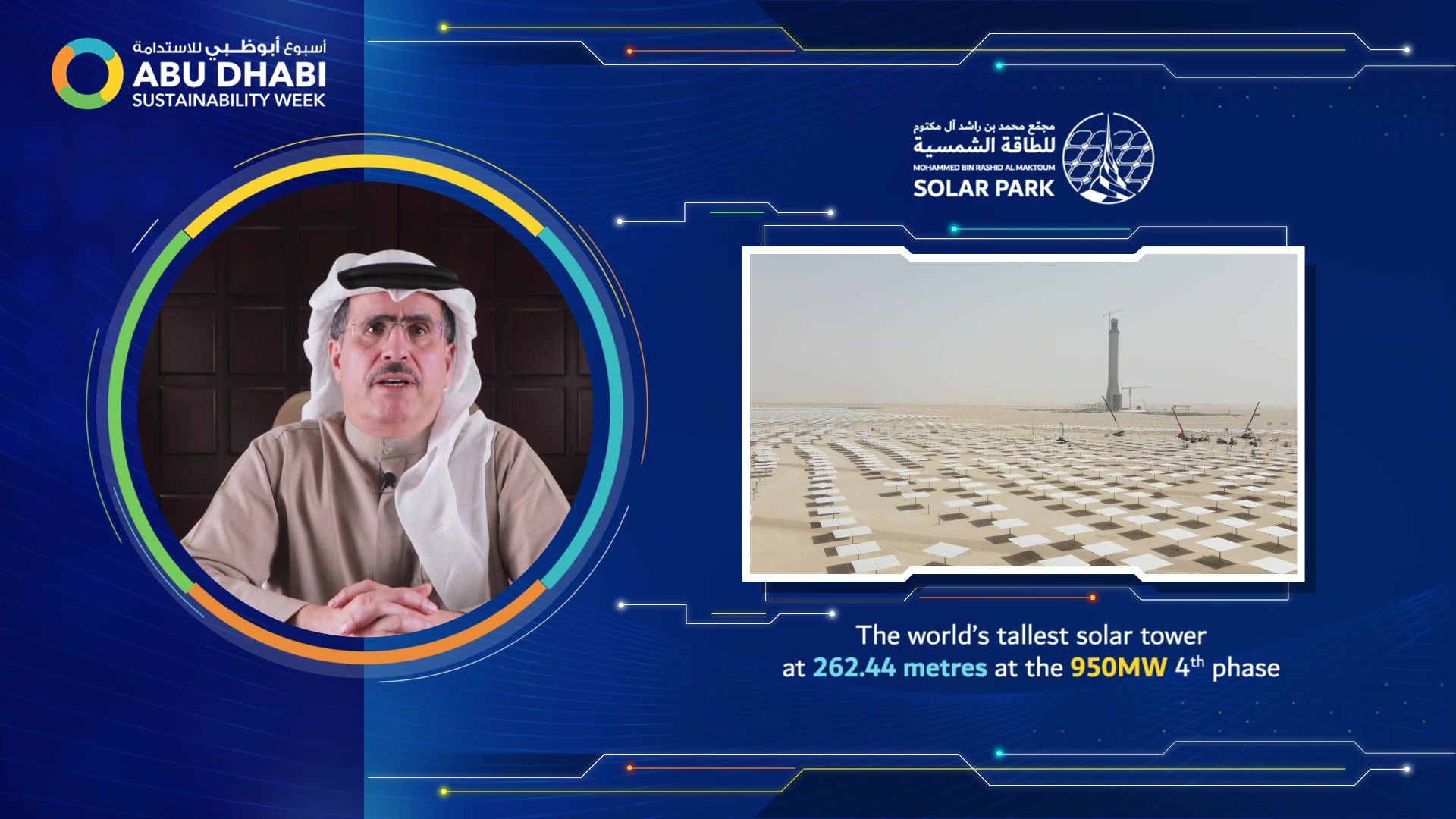During his participation in Abu Dhabi Sustainability Week Summit organised by Masdar
Abu Dhabi, UAE, 19 January 2021(fbmjo.com): HE Saeed Mohammed Al Tayer, MD & CEO of Dubai Electricity and Water Authority (DEWA) has announced that Dubai recorded 1.66 minutes: the lowest Customer Minutes Lost (CML) per year in the world; the lowest electricity transmission– and distribution-network-line losses of 3.2%, and the lowest water-network losses of 5.36%. Al Tayer made these remarks in his speech at the Abu Dhabi Sustainability Week Summit, which was organised by Abu Dhabi Future Energy Company (Masdar) for Abu Dhabi Sustainability Week.
Al Tayer thanked Masdar for organising the Abu Dhabi Sustainability Week Summit. “Last year was a challenge for the entire planet. However, here in the UAE, we are blessed with the wise leadership of His Highness Sheikh Khalifa bin Zayed Al Nahyan, President of the UAE; His Highness Sheikh Mohammed bin Rashid Al Maktoum, Vice President and Prime Minister of the UAE and Ruler of Dubai; and His Highness Sheikh Mohamed bin Zayed Al Nahyan, Crown Prince of Abu Dhabi and Deputy Supreme Commander of the UAE Armed Forces. They have transformed challenges into opportunities, and established sustainable development and energy security as key priorities, with a vision for the UAE to become the world’s leading nation by 2071. This focus has resulted in the UAE achieving world-class results in projects that support sustainable development and combat climate change. In Abu Dhabi, there are leading projects, such as the 2,000MW solar power plant at Al Dhafra, which has completed its financial closing, and the 1,177MW solar power plant in Sweihan, as well as other leading projects,” said Al Tayer.
“In Dubai, we are working to achieve the Dubai Clean Energy Strategy 2050 launched by His Highness Sheikh Mohammed bin Rashid Al Maktoum to provide 75% of Dubai’s total power capacity from clean energy sources by 2050. One of our major projects to achieve this is the Mohammed bin Rashid Al Maktoum Solar Park. This will be the largest single-site solar park in the world with a planned capacity of 5,000MW by 2030 from both photovoltaic and Concentrated Solar Power (CSP) technologies. The first three phases of the Solar Park are now operational with a capacity of 1,013MW. We have 1,850MW currently under construction towards our eventual target by 2030. Dubai Electricity and Water Authority (DEWA) has attracted huge investments in the UAE from the private sector with the Independent Power Producer model. This has created promising opportunities and helped the solar park achieve the lowest prices for solar power projects, five times in a row. We built the world’s tallest solar power tower at 262.44 metres at the 950MW 4th phase of the Mohammed bin Rashid Al Maktoum Solar Park. On its completion, the project will have the world’s largest global thermal storage capacity of 15 hours; allowing for energy availability round the clock,” added Al Tayer.
Al Tayer noted that Dubai has achieved significant success by exceeding the targets set in the Dubai Clean Energy Strategy 2050. The clean energy share grew to 9% of Dubai’s energy mix; exceeding, the target of 7% by 2020. Dubai also exceeded the target of the Carbon Abatement Strategy two years ahead of the deadline. Carbon emissions in Dubai decreased by 22% in 2019, compared to the strategy’s target to reduce 16% of emissions by 2021. In addition, DEWA has achieved globally leading performance results. Fuel-use efficiency in DEWA’s power plants reached 90%, with a cumulative improvement of 31.4% since 2006. DEWA also exceeded the targets for Demand Side Management for both electricity and water. These achievements show Dubai’s progress in reducing its carbon footprint and supporting the UAE’s Nationally Determined Contributions (NDCs) to address climate change.
“Even in the face of the COVID-19 pandemic, DEWA’s state-of-the-art infrastructure, corporate agility, and resilience, has maintained its business continuity and delivery of leading electricity and water services. We have a clear strategy for the energy sector in Dubai, which includes expanding clean energy in line with the UAE Energy Strategy 2050 and the Dubai Clean Energy Strategy 2050, employing digital transformation, smart grids, and the Fourth Industrial Revolution’s tools and disruptive technologies with its impact in the energy and water sectors. To do this, we launched Digital DEWA, our digital arm, to redefine the concept of utilities by becoming the world’s first digital utility to use autonomous systems for renewable energy and storage, expanding the use of AI and digital services, with DEWA’s Moro data hub, and ensuring that DEWA’s services are 100% available by ensuring its infrastructure, advanced digital system, and technological readiness meet the highest international standards,” said Al Tayer.
“Looking back on all these achievements, the UAE has made considerable progress towards sustainable development. Even in the face of world-shaking events, we can take pride in the results, while continuing towards the next steps in shaping a brighter future. We remain committed to our goals, for the citizens and residents of the UAE, and for generations to come,” concluded Al Tayer.
